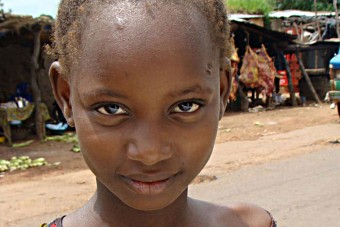GAVI recognised for work to accelerate introduction of HPV vaccines in developing countries

A young girl in Burkina Faso will one day enjoy the same access to the HPV vaccine as their contemporaries in developed nations. Photo credit: UNICEF/Jonathan Shadid/2011.
Geneva, 8 March 2012 – Recognised on Wednesday for its work to accelerate the introduction of vaccines against human papillomavirus (HPV), GAVI is optimistic that as early as 2013 it will be supporting the introduction of HPV vaccines in developing countries.
The burden
Highly transmissible, HPV infection causes virtually all cases of cervical cancer, which kills more than a quarter million women every year1. More than 85% of these deaths are in developing countries, where women often lack access to effective screening and treatment.
Existing HPV vaccines can prevent as many as 70% of all cervical cancer cases. But high prices have been a major barrier to using these vaccines in developing countries where the burden of cervical cancer burden is highest and GAVI is working with manufacturers to reduce the price of HPV vaccines
In November 2011, GAVI’s Board approved support for the HPV vaccine, conditional on securing acceptable price commitments from the manufacturers.
With ingenuity, drive and dedication, we can build a better world for girls and women. Jill Sheffield, Women Deliver Founder and President |
GAVI's support for the HPV vaccine
“We’re delighted to get this recognition from Women Deliver, the leading global organization advocating for improving the health of women and girls,” said Dr Seth Berkley, GAVI’s CEO. “GAVI’s support for the HPV vaccine will prevent death and protect the health of millions of disadvantaged women.”
GAVI’s prioritisation of HPV vaccines was chosen by Women Deliver as one of the “Top 50 most inspiring ideas and solutions for girls and women,” announced ahead of International Women’s Day.
GAVI’s work with the HPV vaccine means that girls in developing countries will one day enjoy the same access to the HPV vaccine as their contemporaries in developed nations.
28 million by 2020
Like HIV / AIDS, cervical cancer kills women in the prime of their lives. But by 2020, GAVI expects to support the immunisation of more than 28 million girls against HPV, protecting them and their families from the vaccine-preventable tragedy of cervical cancer, the second highest cause of cancer death for women in developing countries.
Ahead of International Women’s Day, Women Deliver said it had received hundreds of online nominations from 103 countries. More than 6,000 people voted online to produce the final compilation of the 50 most inspiring ideas and solutions.
“The solutions on this list show that with ingenuity, drive and dedication, we can build a better world for girls and women,” said Jill Sheffield, Women Deliver Founder and President.
1Cervical cancer killed 275,000 women in 2008, according to Global Cancer Statistics 2008 from the International Agency for Research on Cancer (IARC) - http://globocan.iarc.fr/
